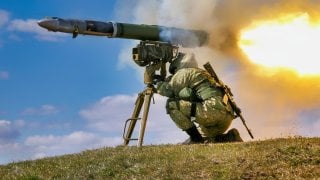The Russian Military Is 'Bleeding Out' in the Ukraine War
Russia suffered more than 10,000 casualties in Ukraine last week, suggesting that the fighting is as intense as ever and could get even more brutal.
Russia suffered more than 10,000 casualties in Ukraine last week, suggesting that the fighting is as intense as ever.
Since February 2022, Russia has endured 690,720 casualties – a shocking number, especially given the lack of territory gained in the process. Yet, the fighting has only intensified. As Newsweek reported on October 28th, Russia had lost 1,680 fighters (killed or wounded) in the previous 24 hours.
In the previous week, Russia had lost 10,490 fighters. Of course, the casualty counts are coming from Ukraine, and have not been independently verified, but we can assume the losses are indeed high and consistent, which begs the question: how long can Russia sustain its casualty rate?
A Grinding Hellscape in Ukraine
The reason Russia is sustaining such high losses: tactical decisions. Putin’s forces have garnered a reputation for employing “meat grinder” tactics, in which infantry-heavy (casualty-sustaining) assaults grind gradually eastward, foot by foot.
The tactics, and the ongoing casualty rates, reinforce stereotypes that the Russians are blasé when it comes to the value of human life. Not to use rhetoric to suggest the Russians are different or subhuman or anything, but it is hard to imagine the US or the British employing “meat grinder” tactics for a sustained period of time. The Western public would be apoplectic. The political will for the conflict would evaporate instantly. Russia, meanwhile, has been throwing human capitol at the Ukrainian defensive lines for three years, seemingly without concern, seemingly without a conclusion forthcoming.
“There are a lot of criticisms because we have lost a lot of our guys because of Soviet-type mindset and strategy, a former Security Service officer told the BBC. “We are limited with manpower. We have no other options tan thinking of our people.
One Ukrainian officer described the Russian tactics from the defensive perspective. “The Russians use these units in most cases purely to see where our firing equipment is located, and to constantly exhaust our units,” the officer told the BBC. “Our guys stand in positions and fighter, and when four or five waves of the enemy come at you in a day, which you have to destroy without end, it is very difficult – not only physically, but also psychologically.”
The tactics have cause Russian casualties to just keep adding up.
“On Friday, Ukraine’s top soldier…said Russia had sustained 17,819 casualties, including those killed, injured and captured, in Kursk in the almost three-month incursion,” Newsweek reported.
During the month of September, Russia recorded the highest number of casualties in any month since the war began. 1,271 fighters per day. To put that in perspective, consider that the United States suffered 4,431 total deaths during the entire nine-year Iraq War, with another 31,994 wounded. Russia surpassed those numbers in the month of September.
Russia’s willingness to endure so many losses speaks to a key Russian advantage over the Ukrainians: population. Russia is significantly more populated than Ukraine. Both countries have resorted to compelling enlistment. Ukraine has closed their borders and is dragging military-aged men off the street to serve. Russia, meanwhile, is using prisoners and offering citizens thousands of dollars to enlist.
About the Author: Harrison Kass
Harrison Kass is a defense and national security writer with over 1,000 total pieces on issues involving global affairs. An attorney, pilot, guitarist, and minor pro hockey player, Harrison joined the US Air Force as a Pilot Trainee but was medically discharged. Harrison holds a BA from Lake Forest College, a JD from the University of Oregon, and an MA from New York University. Harrison listens to Dokken.
Image Credit: Creative Commons and/or Shutterstock.


